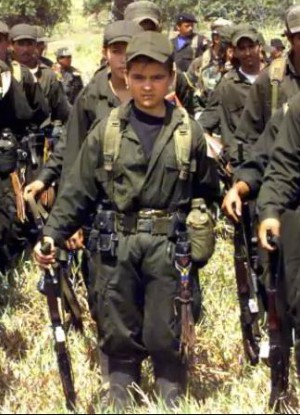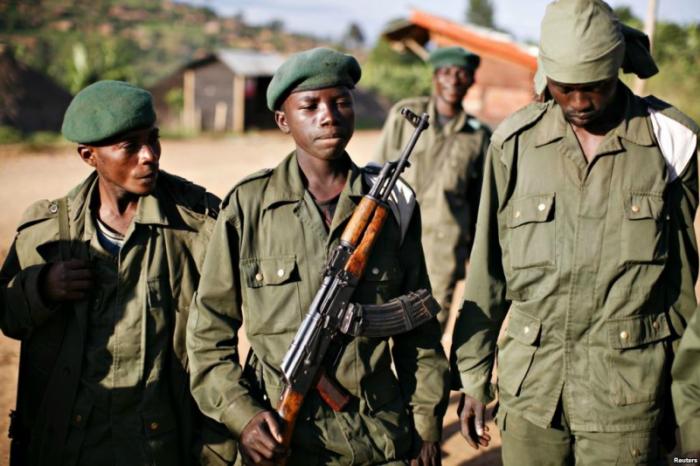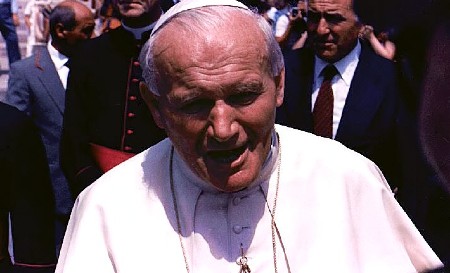We ask you, humbly: don't scroll away.
Hi readers, it seems you use Catholic Online a lot; that's great! It's a little awkward to ask, but we need your help. If you have already donated, we sincerely thank you. We're not salespeople, but we depend on donations averaging $14.76 and fewer than 1% of readers give. If you donate just $5.00, the price of your coffee, Catholic Online School could keep thriving. Thank you.Help Now >
Colombia attempts to revive child soldier program - Why are children joining willingly?
FREE Catholic Classes
Colombia is the only country in the Americas where child soldiers can still be found.
We ask you, humbly: don't scroll away.
Hi readers, it seems you use Catholic Online a lot; that's great! It's a little awkward to ask, but we need your help. If you have already donated, we sincerely thank you. We're not salespeople, but we depend on donations averaging $14.76 and fewer than 1% of readers give. If you donate just $5.00, the price of your coffee, Catholic Online School could keep thriving. Thank you.Help Now >

It is believed around 6,000 minors still fight in Colombia.
Highlights
Catholic Online (https://www.catholic.org)
2/8/2017 (7 years ago)
Published in Americas
Keywords: Colombia, child soldiers, abuse
Rome, Italy (CNA/EWTN News) - Despite the recent signing of a peace agreement between the Colombian government and FARC rebels, it's estimated that some 6,000 minors are still fighting for the guerrillas, though the numbers aren't exact.
However, what is known for certain is that thousands of youth in the country hit 18 after spending years of their childhood in armed combat.
While the phenomenon is typically associated with Africa, it's a surprisingly raw reality for Colombia, since poverty and domestic violence often leave many youth desperate, making the desire to leave home and join criminal gangs or, in this case, guerrilla forces, seem like an exciting alternative.
This was the case for Catalina and Manuel - two youth from difficult backgrounds who left home and joined forces with the Revolutionary Armed Forces of Colombia (FARC), fighting in their ranks for several years until traumatic events eventually drove them to leave.
In a documentary on Salesian efforts to help troubled youth in Colombia, Catalina shared her heart-wrenching story, recounting how ever since she was little "I had issues with my stepfather. He got drunk and beat me, he always gave me bruises."
"He hit me with hot sticks, straight from the fire. I had problems with him because he tried to abuse me," she said. While she was able to resist her stepfather's advances, when she attempted to tell her mother what happened, "my mother never believed me."
Catalina described how when her stepfather would hit her mother, she would defend her, but sometimes her mother hit her as well.
"It was too much," she said, explaining that "I grew to hate my mother." She eventually started smoking, partying and using "basuco" - a paste used as a base for cocaine - before attempting suicide.
However, one day when she while she was out she heard a sound like "metal against metal." When she saw that it came from FARC guerrilla fighters, she immediately left to join them at age 13.
While at first being with the guerrillas seemed "like a dream," Catalina, who was handed a gun that was bigger than she was after just eight days in the guerrilla camp, soon found herself asking "what have I got myself into now?"
Describing the most traumatic moment during her time with the guerrillas, Catalina explained that she and her boyfriend at the time were among 44 people, including many children, who arrived at another camp.
 Hi readers, it seems you use Catholic Online a lot; that's great! It's a little awkward to ask, but we need your help. If you have already donated, we sincerely thank you. We're not salespeople, but we depend on donations averaging $14.76 and fewer than 1% of readers give. If you donate just $5.00, the price of your coffee, Catholic Online School could keep thriving. Thank you. Help Now >
Hi readers, it seems you use Catholic Online a lot; that's great! It's a little awkward to ask, but we need your help. If you have already donated, we sincerely thank you. We're not salespeople, but we depend on donations averaging $14.76 and fewer than 1% of readers give. If you donate just $5.00, the price of your coffee, Catholic Online School could keep thriving. Thank you. Help Now >
When night came, she and her boyfriend were alone when around eight helicopters attacked their battalion.
Soon "something collapsed on me and I fell in a deep sleep. I felt sleepy and in a stupor," she said.
While her head was still spinning, her boyfriend told her to run because the Colombian army was nearby, so "I ran as fast as I could."
Catalina recalled how her boyfriend covered for her as she ran, but was shot and killed during the attack. "It's tough when you share a lot with someone and they kill him," she said, noting that she still wears a necklace he had given to her.
After experiencing the traumatic death of her boyfriend and many other friends, coupled with a sharp distaste for the disparity of how different members of the guerrillas were treated based on their status, at 16 Catalina eventually summoned the courage to run away, despite knowing the guerrillas would kill her if they ever found her.
Similarly, Manuel recounted in the documentary how he ran away from home with his brother when he was just eight-years-old due to poverty.
"We didn't have much at home, so my brother and I decided to hit the streets together," he said, adding that they eventually joined FARC forces simply out of curiosity.
"In the wilderness, your life starts to be a weapon," he said, explaining that daily concerns quickly shift from simple things to something "as significant as taking a life of another. In the end, it was normal to kill someone."
Manuel then recalled the moment his brother was killed for disobedience. Being the type of person who did what he wanted whenever he wanted to, Manuel's brother began to break the rules in the camps they lived in.
"He didn't change, he kept doing it and they decided to kill him," Manuel said, explaining that he was able to say goodbye, but felt lost once his brother had been executed.
Since his brother was like "a mom and dad" to him, Manuel felt that after his brother's death there was nothing left for him in the guerrillas, so he left, eventually ending up at the Salesian-run Don Bosco City in Medellin, where Catalina had also ended up.
The two youth, who used fake names for the sake of protection, are now both 19, and have been able start a process of healing and reintegration into society with the help of the Salesians at the center.
The Don Bosco City in Medellin focuses specifically on helping youth, and has so far helped 1,300 youth from lives of brutality, violence and emotional turmoil. A similar center in Cali has in its 15 operating years save some 2,300 youth from the same fate.

Please pray to end the training and use of child soldiers.
Services offered in the "city" include rehabilitation projects and psychological support, since many of the youth that come through have lived through traumatic and violent events.
Many of the girls who come have been abused, while some of the youth have even forced to choose between family members, kneeling on the floor at gunpoint and pointing out who lived and who died.
Since many of the girls have lived in brutal conditions, learning to be tough and to fight, part of the services provided at the center include teaching the girls what it means to be a woman through activities aimed at expressing their femininity.
A final phase of the program provides education and workforce development, since many of the youth dropped out of school at a young age and have an incomplete education when they arrive.
Both Catalina and Manuel have gone through the final "reinsertion" phase of the center, and are pursuing careers. While Manuel is learning technical engineering, Catalina is hoping to study at university to fulfill her lifelong dream of being a nurse.
The director of the center, Salesian priest Fr. Rafael Bejarano, was present at a Feb. 2 news conference on the documentary, alongside James Areiza, coordinator of the projects of protection and prevention at the Don Bosco city.
Bejarano told journalists that what the Church is doing, "without belonging to any political party, is to support the work the national government, together with the FARC, are doing: building together."
"It's not about demanding the guerrillas demobilize and give in their weapons, but about moving forward together," he said, noting that this type of cooperation is the only way for Colombians to build lasting peace after the country's 52 year conflict.
Since 1964, as many as 260,000 people have been killed and millions displaced in Colombia's civil war.
According to Human Rights Watch, with more than 6.8 million people forcibly displaced due to the conflict, Colombia has the world's second largest population of internally displaced people, with Syria in first place.
In August 2016 a peace accord between the Colombian government and the country's largest rebel group, Revolutionary Armed Forces of Colombia (FARC), was finally reached following four years of negotiations in Cuba.
However, the agreement was narrowly rejected in a referendum Oct. 2, with many claiming that it was too lenient on FARC, particularly when it came to kidnapping and drug trafficking.
We ask you, humbly: don't scroll away.
Hi readers, it seems you use Catholic Online a lot; that's great! It's a little awkward to ask, but we need your help. If you have already donated, we sincerely thank you. We're not salespeople, but we depend on donations averaging $14.76 and fewer than 1% of readers give. If you donate just $5.00, the price of your coffee, Catholic Online School could keep thriving. Thank you.Help Now >
A revised agreement was signed Nov. 24, and sent to Colombia's Congress for approval, rather than being submitted to a popular vote. The reformed accord was approved Nov. 30, with revised features including the demand that FARC hand over assets to be used for reparations, a 10 year time limit for the transitional justice system, and FARC rebels' providing information about their drug trafficking.
Since the agreement took effect abuses attributed to FARC forces have fallen sharply, according to Human Rights Watch. However, the country's second largest guerrilla group, the National Liberation Army (ELN), continues to commit serious abuses against civilians such as kidnapping, murder, forced displacement and child recruitment.
In his comments to journalists, Fr. Bejarano said that despite the unrest, the real Colombia "isn't known in the world."
Describing the country as "beautiful, multi-cultural, with an enormous natural wealth," he said Colombians want peace, but the ability to dialogue and to build a proper "political culture" are still a work in progress. This, he said, is why the popular vote was against the referendum.
Catalina, who was present with Manuel at the new conference, said that for her the days leading up to the referendum were "moments of joy," since in her mind and in the minds of many others with her background it meant that "no more children will be there (with the guerrillas), it's going to be different, we will be able to return to our homes."
Both she and Manuel live in separate camps away from their families, but are able to communicate via cell phones and, in Catalina's case, rare visits.
Although she was sad when the popular vote rejected the referendum, Catalina said she feels a lot of "interior peace," which is the first thing people must work for. If true peace is to be achieved, people have to "think about the other, not only ourselves," she said.
Both she and Manuel are hopeful about the situation, saying it comes down to making a daily commitment to work for peace.
As far as reintegration, Catalina noted that "everyone makes mistakes," and that for certain people, there will always be a hole in their lives that can't be patched up.
"There are many people who hold a grudge for what happened, for the massacres they lived and don't forgive," she said, but added that for the youth who have come through the Don Bosco City, "we have an opportunity."
"There are many who don't want it, but we must give the opportunity despite all these (things)," and must make the most of what they themselves have received.
---
'Help Give every Student and Teacher FREE resources for a world-class Moral Catholic Education'
Copyright 2021 - Distributed by Catholic Online









 Daily Readings for Thursday, April 25, 2024
Daily Readings for Thursday, April 25, 2024 St. Mark: Saint of the Day for Thursday, April 25, 2024
St. Mark: Saint of the Day for Thursday, April 25, 2024 Prayer for Policemen: Prayer of the Day for Thursday, April 25, 2024
Prayer for Policemen: Prayer of the Day for Thursday, April 25, 2024


